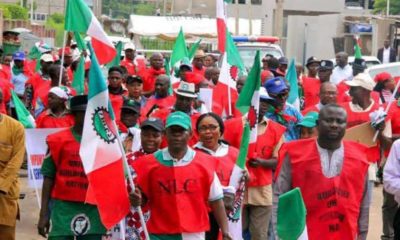The tripartite committee tasked with reaching a consensus faced a deadlock as labour representatives rejected the government’s proposed offer of N57,000.
Instead, labour unions put forth a counterproposal of N497,000, further complicating the negotiation process.
The meeting, which took place in Abuja on Wednesday, May 22nd, concluded without a resolution, prompting the committee to adjourn until the following Tuesday, May 28th.
Sources privy to the discussions revealed that initial deliberations saw the government maintain its stance on a proposed N54,000 minimum wage, citing financial constraints.
However, following a brief recess, both government officials and representatives from the organised private sector (OPS) revised their offer to N57,000.
Despite this adjustment, labour unions stood firm on their demand for a significantly higher minimum wage, expressing discontent with the proposed figure.
In a surprising move, they presented a counteroffer of N497,000, signaling a wide gap between the two parties’ positions. As a result, the meeting ended without consensus.
Key figures in the negotiations, including Governors Obaseki and Uzodinma as well as Governor Soludo, who participated remotely via Zoom, emphasized the need for the government to demonstrate seriousness in addressing the labour unions’ concerns.
The failure to bridge the divide between labour’s expectations and the government’s offer highlights the complexity of the issue and the urgency of finding a mutually acceptable solution.
Responding to the outcome of the meeting, a senior official from the Nigeria Labour Congress (NLC) expressed disappointment, describing the negotiation process as discouraging.
Despite the government’s modest increase from N54,000 to N57,000, labour unions found the proposal inadequate, resulting in the impasse witnessed during the meeting.
The adjournment of further deliberations to the following week underscores the need for both parties to reassess their positions and explore avenues for compromise.
The minimum wage negotiation process, initiated by President Tinubu through Vice President Kashim Shettima, commenced in January 2024 with the inauguration of the tripartite committee.
Charged with recommending a new minimum wage ahead of the expiration of the current N30,000 wage, the committee comprises representatives from the federal and state governments, the private sector, and organised labour.
Despite early optimism surrounding the committee’s formation, the divergence in proposed minimum wage figures highlights the challenges of addressing the diverse economic realities across different regions of Nigeria.
As the negotiation process enters a critical phase, stakeholders are urged to approach the discussions with openness and flexibility to facilitate a mutually beneficial outcome.
The adjournment of the committee’s meeting underscores the need for constructive dialogue and collaborative efforts to reach a consensus that addresses the concerns of all parties involved.


 Billionaire Watch3 weeks ago
Billionaire Watch3 weeks ago


 Startups4 weeks ago
Startups4 weeks ago


 News4 weeks ago
News4 weeks ago


 News4 weeks ago
News4 weeks ago


 Bitcoin4 weeks ago
Bitcoin4 weeks ago
 Naira4 weeks ago
Naira4 weeks ago
 Forex3 weeks ago
Forex3 weeks ago
 Treasury Bills4 weeks ago
Treasury Bills4 weeks ago
















